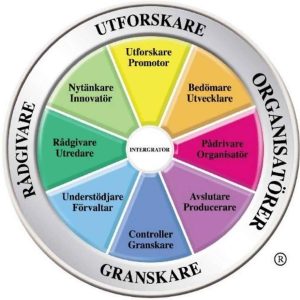The Team Management Profile can be used in many different contexts in working life, from individual and group development to recruitment and business development. The problem with many existing instruments is that they focus on the personality instead of how people function at work. The strength of TMP is its unique focus on both “the person at work” and the content of the work. The tool is useful in both an individual and a collective context to explore individuals’ strengths, opinions and preferences and thereby be able to create a dynamism for a creative and productive collaboration.

Examples of areas of use
- Personnel and individual development
- Group development
- Business development
- Leadership development
- Project development and staffing
- Career planning
- Recruitment
- Coaching
- Leading by inequality
- Approach
Leadership development – to enrich the participants’ insight into their own way of functioning and to understand more about the driving forces that govern choices and attitudes in the work situation. TMP then becomes a basis for reflections on one’s own leadership and a support in personal development.
Team development – as support for groups to develop their ability to collaborate, to discover the power and excitement of human differences and to make full use of the combined competence of a work team. TMP provides a personal profile, which provides a picture of their own work preferences, but overall also a group profile. With the help of the TMP wheel, the result is related to the tasks and what strengths and weaknesses can be accommodated in the group profile in relation to the group’s mission, goals and ambitions. The work team can then discuss their own way of working and how different aspects can be strengthened or improved.
Career counseling – to create insight into your own way of working and understand more about the driving forces that govern choices and attitudes in professional development. TMP then becomes a basis for reflections on your own strengths and weaknesses and a support in personal development.
History
In the late 1970s, international management consultants Dr. Charles Margerison and Dr. Dick McCann conducted extensive research to identify the reasons why some organizations, leaders, and teams were successful while others failed. How did similar teams and organizations achieve such different results in their work? What were the factors for success?
In the researchers’ studies, they were able to identify eight types of work or work functions that proved to be important and crucial prerequisites for productive work. These were found with greater or lesser strength in all groups and could in that sense be seen as universal. They were arranged in a logical flow in a wheel that constitutes the model Types of Work. The next step for the two researchers was to develop a measuring instrument that indicates how we humans relate to the different work functions, such as our preferences for different types of tasks. Carl Jung’s theory formation about personality types with an adaptation and connection to the work was chosen as the basis for this work. TMP has a very comprehensive scientific documentation and meets very strict requirements for reliability. It is an international tool and is used worldwide. The database contains about 500,000 people, of which 6,000 are in Sweden.
The model
The “Types of Work” model graphically demonstrates the eight factors and integration function that researchers were able to identify as important to effective teams and well-functioning organizations. The flow of tasks within a team or organization, ranges from a basic information gathering activity, innovation and development to final production, review and management. The eight steps, each word a distinct part of a particular work process, are as follows:
| Advising Gathering and reporting information |
Organizing Establishing and implementing ways of making things work |
Innovating Creating and experimenting with ideas |
Producing Concluding and delivering outputs |
| Promoting Exploring and presenting opportunities |
Inspecting Controlling and auditing the working of systems |
Development Assessing and testing the applicability of new approaches |
Maintaining Upholding and safeguarding standards and prcesses |
Quality assurance
TMP is only offered together with process assistance from an accredited supervisor. This allows us to ensure a short starting distance with high quality of the result.
Getting your profile done and working with your team with TMP is not something you do on your own. To get the most out of the process, it should be supported by an accredited supervisor. The supervisor facilitates the process by explaining the theory and research behind the concepts and how they are best applied in everyday work. You avoid the pitfalls and misunderstandings that can arise when working with this type of profile. The supervisor also guarantees that the focus is on development: of the individual, team and organization.
Contact us
Do you want us to contact you for an unconditional meeting of your needs? Call 08-56 46 09 90, email office@kontura.se or send us a message through the form below and we will contact you!
Other tools for effective teams
The communicator
The purpose of CFI is to reconcile and evaluate how management and leadership work both on an individual and organizational level in relation to the assignment. The results provide impulses for continued development and a basis for planning initiatives.
Climate analysis
With the help of seven scale steps, the respondent evaluates what is most characteristic of the working climate for instance. This type of scale has been used in measurements of people’s values and attitudes to some area, such as working environment.
Management team development
Does your management team work with the right things? Are you stuck in “rush issues”? Many managers today are unclear about what the assignment should be. It is also common for special interests to take over and reduce the joint responsibility for the whole. If the management team does not work fully, the control does not work as intended.
Manager profile
The manager profile provides significant insight into your own leadership behavior and is a powerful support in managers’ development. The manager profile is mainly used in connection with leadership development in both longer or shorter programs.







